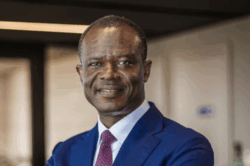The Ghana National Chamber of Commerce & Industry (GNCCI) in collaboration with the BUSAC Fund has organised a three-day residential retreat with stakeholders in Koforidua, Eastern Region.
The rationale for the retreat – dialogue and post-dialogue meetings – was to reach a consensus and build synergies among stakeholders, via the GNCCI Business Pulse, to provide continuous business diagnostics data for policy innovation as well as monitor business performance.
In his opening remarks, Clement Osei-Amoako, President of GNCCI, emphasised the importance that stakeholders attach to the mobilisation of business diagnostics data to inform policy design and implementation.
He noted that the GNCCI has developed a robust analytical framework that adopts evidence-based approach to index and track business value and growth metrics, risk exposures and mitigating strategies, as well as impact of industrial and trade related policies on businesses in the country.
Mr. Osei-Amoako was of the firm conviction that the business diagnostics report presents the country with a huge opportunity to assess the readiness of micro, small medium enterprises as well as corporates and large enterprises in the participation of the AfCFTA.
He assured the stakeholders of the GNCCI’s commitment in using business data analytics to provide targeted business-support services to its members and the wider business community.
The Fund Manager of BUSAC Fund, Nicolas Gebara, commended the GNCCI for the initiative, saying: “This is a real approach of having a constructive means to dialogue and to help the growth of SMEs in terms of job creation.”
In his presentation, Mr. Julius Bradford Lamptey, Head of Research & Advocacy at GNCCI, underscored the Chamber’s legislative mandate of promoting and protecting commercial and industrial interests in the country.
He noted that one of the legislative functions of the GNCCI is the “collection and circulation of statistics relating to trade, commerce, industry and manufactures.” Thus, the GNCCI Business Pulse serves as one of the avenues adopted by the Chamber to mobilise business diagnostics data to serve the interest of the private sector.
As a trailblazing initiative in Ghana and West Africa, Mr. Lamptey reiterated that the GNCCI Business Pulse would seek to build synergistic relationships with stakeholders in mobilising the requisite data to inform policy innovation and design.
For his part, Dr. Samuel Frimpong Boateng, the Lead Consultant for the project and CEO of Africa Investments and Development Group (Afrideg), said 61 variables were used to construct eight indexes to track and predict business growth and performance across 17 industries.
They include: growth; value; resilience; business dynamic; and risk business Indexes. The rest are business sustainability index, quality composite score and industry profiles.
Key findings
The key findings showed that corporates and large enterprises were generally value-driven but not growing. Nonetheless, these enterprises tend to be mostly sustainable, resilient, and stable given their value-orientation.
On the other hand, MSMEs were generally growth-driven with little or no value-orientation. In addition, their growth was not resilient, sustainable, innovative, and stable. The overall analysis suggested that the business growth of enterprises was relatively less stable and more sensitive to economic cycles. The study also revealed that most of the growth-resilient industries were in the manufacturing sector, followed by professional services, and education.
The industry profiling captured certain key metrics in assessing their respective performance. The construction, banking, mining & quarry, transport, and agro processing industries demonstrated more stable and rising EBITDA numbers, reflecting operational efficiency.
Further, the construction, professional services, human health, and wholesale and retail industries generated at least GH¢1 in sales with every Ghana Cedi of assets invested over three consecutive years. Although the banking and mining and quarry industries generated less than GH¢1 in sales, they consistently generated positive asset turnover ratio over the period.
In his closing remarks, the President of GNCCI, Mr. Osei-Amoako expressed his appreciation to the stakeholder representatives and urged them to communicate the outcome of the dialogue and post-dialogue meetings for institutional support. He noted that the GNCCI would continue engaging them at different levels to formalise the discussion.
The event was attended by 11 institutions: Bank of Ghana; National Development Planning Commission; Ghana Statistical Service; Ministry of Trade & Industry; Ministry for Business Development; Ghana Investment Promotion Centre; and Registrar-General’s Department.
The rest are: Private Enterprise Federation; Ghana Association of Bankers; Ghana Association of Savings & Loans Companies; and the ARB Apex Bank.










